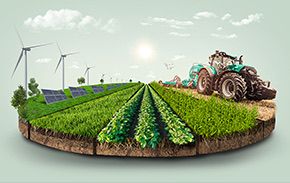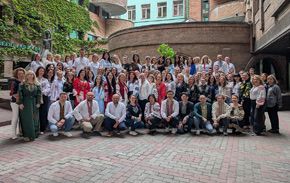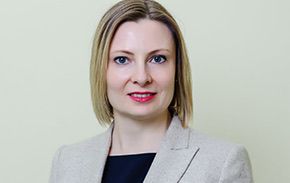You need to be both a financial expert and a farmer to finance agribusiness - Credit Agricole
Oleksii Stupak, the Head of Corporate Business Development Department at PJSC “Credit Agricole Bank”, reflects on the dynamics and perspectives of Ukrainian agrolending market development
“APK-Inform”, 17.08.2013
According to the First Vice Prime Minister Serhii Arbuzov, Ukrainian agricultural sector has reached leading positions in national economy by increasing the production rate by 15% on completion of the first half of 2013. But government officials of different levels admit that the development rate of agricultural sector, particularly crop farming, could be much higher if it were sufficiently funded. At the same time, lending is one of the main sources of agricultural production financing. We have discussed the dynamics and perspectives of Ukrainian agrolending market with Oleksii Stupak, the Head of Corporate Business Development Department at PJSC “Credit Agricole Bank”.
- Agrarians have started preparations for the autumn sowing campaign in Ukraine. What are the rates and volumes of credit funds attracted for the sowing campaign? On what terms can agricultural producers get a loan?
- So far, we observe greater involvement in harvesting than in autumn sowing campaign, and seeing that the prices on agricultural products are low, there is a need to use credit funds in order to wait for an appropriate price. As a result, now we are concluding a reasonably large number of agreements on financing of grain warehouse stocks secured by agricultural products at the grain elevator. At present the cost of financing equals to 18,5% p.a. in national currency and 9,5-10% p.a. in USD.
- Oleksii, what agr ibusiness segment (small, medium, big) has the highest demand for credit facilities and for what purpose (purchase of seeds, equipment, fuel products, plant protection agents)?
ibusiness segment (small, medium, big) has the highest demand for credit facilities and for what purpose (purchase of seeds, equipment, fuel products, plant protection agents)?
- We work with all segments, from the smallest farms and to the largest agricultural holdings of the country, leaders of the sector. We finance both working capital (plant protection agents, fertilizers, fuel, seeds, investment needs, i.e. machinery, increasing processing capacity in case of vertical integration) and infrastructure projects, including grain elevators, which are in short supply in Ukraine at the moment, even taking into account planned growth of gross collection. We finance such projects for a period of up to 5 years, and we have special offers, which can optimize the cost of financing for our borrowers.
Moreover, in order to optimize the expenses on financing of our clients we have created a joint partnership program, within the framework of which an agricultural producer can pay for plant protection agents with a bill, having paid 5% p.a. for it, which is hardly comparable to a loan at 18,5 % p.a.
- Were there any changes in the dynamics of credit attraction for the sowing season over the last few years? In particular, are there any distinctive features of credit provision to the agrarians this year compared with the previous one?
- We are constantly increasing the number of our partners, and the ones who have been working with us for a fairly long time receive increased amount of financing. This is called forth by a completely different range of factors: increase in the area cultivated, establishing vertical integration, improvement of technologies (usage of higher quality materials, plant protection agents, machinery and equipment, etc.) All in all, the dynamics is as follows: every year we renew loans for the enterprises, which used them last year, in addition we top up their loans, and we also start working with new companies. Every year our portfolio in agricultural sector is increasing.
- Do you think that dynamics of credit attraction is influenced by the seasonality of agricultural production?
- Overlapping of production cycles is not typical of the companies which deal only with plant cultivation and don’t have vertical integration (production of sugar, oil, etc.). Seasonality of credit attraction is more pronounced there. Thus, issue of loans starts with the purchase of seeds and fertilizers in December. The main activity takes place during May-June, and starting from July it gradually decreases provided the grain prices are favorable. If they leave much to be desired, then, starting from October, we usually observe a decline.
- What is the benefit of taking loans from banks in comparison with the other forms of financing?
- For the time being lending is the best way to get funds. Bond market aimed at raising funds for long-term projects is virtually non-existent within the country, markets outside the country are available to very few and are pointless if you need a small amount. Capital financing by means of attracting an investor is much more costly than the borrowed one. Leasing is still underdeveloped and in many cases it is more expensive than a loan or it bears currency risks, which is unacceptable for a company without currency earnings.
- When offering credit funds, there is always a risk that they may not be returned or that the payments wouldn’t be made in time. What precautions are taken by “Credit Agricole” to lower the risks in the process of debt collection?
- First of all, to finance this business one needs to be not only a financial specialist but a farmer as well. With the aim of minimizing such risks we have created an agricultural team, which consists of agrarians and a vet. Knowledge of technologies, production cycle and our reputation allows us to keep the level of risk within the acceptable parameters.
- Oleksii, a new player has entered the agricultural lending market of Ukraine in 2013: the State Land Bank. According to Svitlana Skosyrska, the Chairman of the State Land Bank Board, the main purpose of this financial institution is to encourage commercial banks to actively extend loans to agrarians, which will lead to decrease in credit interest rates. From your point of view, what can change in the agricultural lending market of Ukraine with the creation of the State Land Bank?
- At the moment, neither us nor our clients have felt any changes. But I am sure that we will be able to discuss its influence only after its first steps.
- Another novelty is agricultural warrants. Will they allow to increase lending to agricultural enterprises?
- If agricultural warrants are properly implemented, they will boost financing of the agricultural sector. But one shouldn’t forget that even the best idea can backfire. Along with the new possibilities we will encounter new risks, such as liability of grain elevators for the quality and availability of grain.
Print version

 Useful information
Useful information
 Useful information
Useful information
 Useful information
Useful information
 Useful information
Useful information
 Useful information
Useful information
 Useful information
Useful information
 Useful information
Useful information
 Useful information
Useful information
 Useful information
Useful information
 Useful information
Useful information
 Useful information
Useful information
 Useful information
Useful information
 Useful information
Useful information
 Useful information
Useful information
 Useful information
Useful information

 ibusiness segment (small, medium, big) has the highest demand for credit facilities and for what purpose (purchase of seeds, equipment, fuel products, plant protection agents)?
ibusiness segment (small, medium, big) has the highest demand for credit facilities and for what purpose (purchase of seeds, equipment, fuel products, plant protection agents)?




